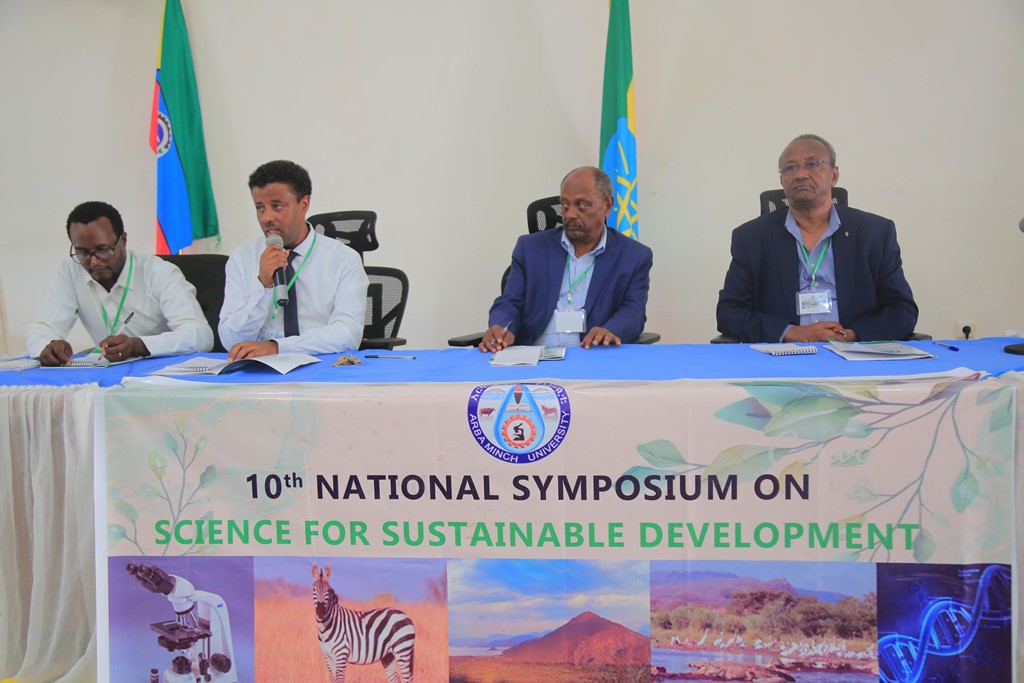Arba Minch University organized the 10th Annual National Research Symposium on Science for Sustainable Development on March 30, 2024. Click here to see more photos.
In his welcoming remarks, Research and Community Engagement Vice President, Behailu Merdekios/Assoc. Prof/ said the symposium stands as a testament to our collective commitment towards advancing research for sustainable development in Ethiopia and beyond. He added that the theme underscores the critical role scientific research plays in shaping a better future for our communities, nation, and planet. Having a proud legacy of research excellence since its inception, AMU has collaborated with several partners from around the world, contributing to groundbreaking projects in fields such as water resources, health, agriculture, and technology, the vice president noted.
Dr. Alemayhu Chufamo, AMU's Academic Affairs Vice President and delegate of the President, officially opening the event, said that AMU has achieved glorious success in terms of student enrollment, academic program expansion, research, and community engagement endeavors over the last three decades. Since the problems and solutions of science, particularly in third-world countries, are far from exhausted, we are all expected to work and contribute our part as a professional and human obligation to make this world more conducive to living, the vice president emphasized.
Dr. Tesfaye Habtemariam, Director of AMU's Executive Research Directorate, on his part, stated that the symposium was co-organized by the three colleges: - College of Medicine and Health Sciences, College of Natural and Computational Sciences, and Agricultural Sciences. 28 papers from various universities and research organizations were presented during this one-day event, he said. According to Dr. Tesfaye the noteworthy occasion was intended to provide a place for sharing scientific experiences, knowledge, and innovations as well as to strengthen the link between science and society.
Prof. Fassil Assefa, a microbiologist at Addis Ababa University/AAU/, stated in his keynote presentation that science plays a crucial role in resolving development issues through research-based technical developments and advancements. He noted that since global partnerships for sustainable development are currently declining, avoiding dependent mentality, mobilizing indigenous resources, prioritizing technology and commercialization, and importing substitutions are all required to deliver sustainable development to Ethiopia. It is also necessary to promote the use of public-private partnerships and expand knowledge-based small and medium scale firms, he stressed.
The second keynote speaker, Dr. Teshome Gebre, Consultant Health Science Specialist, Regional Director for Africa for The Task Force for Global Health, said that sustainable development needs to be guided by the concept called “Sustainability Science" which is the study of the dynamic relationship between humans and the environment. He also added that since we are in the era of digital technology and artificial intelligence (AI), we have been noticing digital transformation in educational, global, public health and medical services, banking, and other sectors. Therefore, it is high time for the research community to adapt and tap into the technological advances in this space, he expressed.
Prof. Yishak Kechero of AMU, in his paper entitled "Mineral Cycle in Soil-Plant-Cattle System: Factors Influencing Mineral Status of Zebu Cattle (Bos indicus), with an Emphasis on Copper," pointed out that mineral imbalances, toxicity, and deficiencies are common in free-ranging zebu cattle in tropical and subtropical regions. The professor stated that the study was carried out in three altitude zones of Southwest Ethiopia in order to evaluate the impacts of different management approaches on cow copper status as well as the combined effects of Cu and management on productivity and reproduction performance of free-ranging cattle. The study's findings revealed a lack of trace elements in the majority of the studied locations as well as a significant scarcity of copper which has correlational effects on high food concentration, productivity and reproduction of cows.
Another presenter from the University of Haramaya, Mustefa Bati, Presenting the paper on “Impacts of Climate Smart Agricultural Technologies Adoption on Food and Nutrition Security of Wheat Farmers in Arsi Zone, Oromia Region, Ethiopia”, said climate-resilient crop production requires the use of crop technology that can sustainably increase productivity, decrease vulnerability, and improve resilience. According to the presenter, the adoption of climate-smart agricultural technologies has a positive and significant impact on improving food and nutrition security in the study area. Therefore, the researcher recommended that expanding the implementation of climate-smart agricultural technologies to improve the food and nutrition security of smallholder wheat farmers is mandatory.
Researchers from Arba Minch, Salale, Jimma, Gondar, Oda Bultum, Madda Walabu, Wellega, Mettu, Adama Science and Technology, and Haramaya universities participated; AMU top and mid-level officials, researchers, and academic staff were in attendance.
Arba Minch University
The Center of Bright Future!
For more Information Follow us on:-
Website - https://www.amu.edu.et/
Telegram - https://t.me/arbaminch_university
Facebook - https://www.facebook.com/ArbaMinchUniversityCAD/
YouTube - https://www.youtube.com/channel/UCOO_nclhMo8M3r74OyPBlVA
Communication Affairs Directorate
